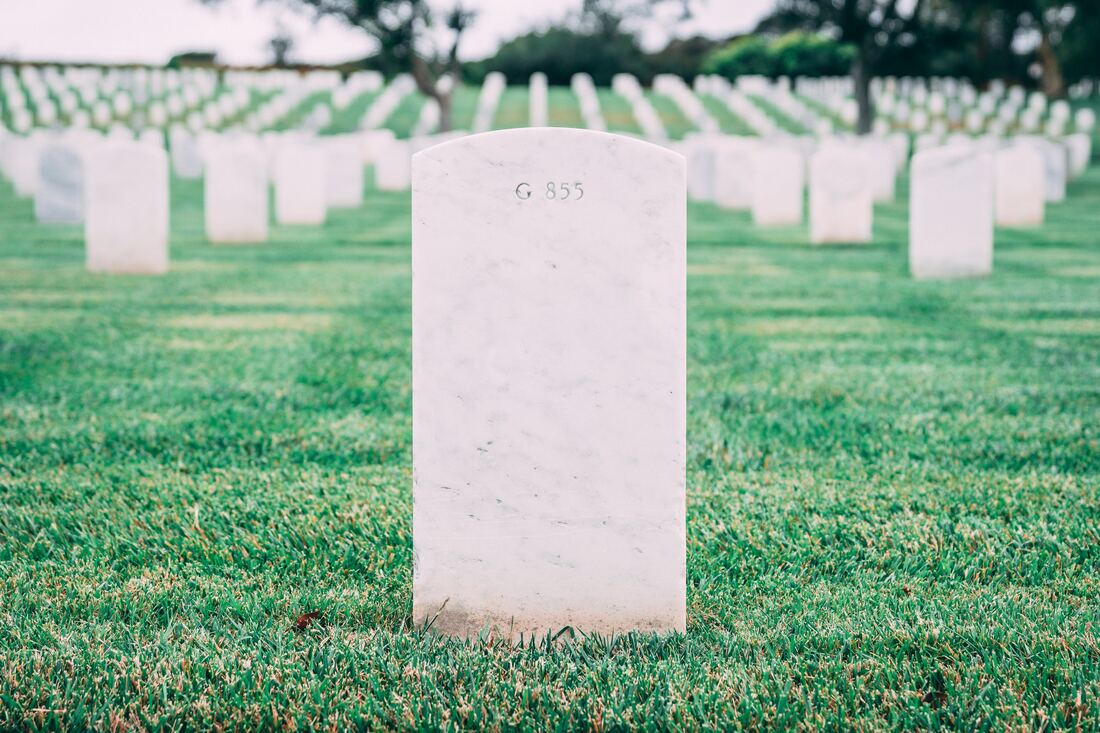|
When my children were young, when I was run ragged working, dieting, and binge eating while sparring itinerant depression, my mother sent me crisp $20 bills with the note, "for the grave." She meant her mother's grave—my Noni, toughest broad I'd ever known, the one who loved me most fiercely. I lived near Noni's cemetery in New Jersey, but Mom had moved 2700 miles across the land. In spring, she wanted me to plant fresh annuals on Noni's resting place; in December, to lay a plastic holiday wreath; at Easter, to pound a palm cross into the ground; in fall to put potted purple mums in front of the stone where it said Josephine Marco. Some days, some years, I did those things, stopping first at the nursery or supermarket with my two sweet and curious boys, then parking along the narrow-edged cemetery lane. There, I'd unload the older boy along with his bright green shovel, my hammer, a pink water can, and bundle the smaller boy into his stroller. Some days, some years, we snapped pictures—me, hair astray, wearing a dirt-smudged too-tight top, and two smiley boys, not at all bewildered to be posing in that quiet, verdant place, next to a granite marker. When my boys were nearly men, I found those photos in my dead mother's nightstand, and was sickened with a sharp stab of guilt. Although I always said, "Yes, I took care of it," when Mom asked if I did the grave, what she never knew is often, I didn't. I hadn’t. Instead, the twenties went toward a toddler's eyeglasses, my therapist bill, ingredients for ice box cake—the bananas-graham crackers-pudding dessert Noni fed her grandchildren every Sunday. I never confessed because it didn't feel like cheating, then. It felt like a kind of fierce love. Today, Mom is buried nearby, and I'm not so sure.  Lisa Romeo is the author of the memoir Starting with Goodbye (University of Nevada Press). Her nonfiction is listed in Best American Essays 2018 & 2016, and has appeared in the New York Times, Longreads, Brevity, among other places. She lives in New Jersey. Visit Lisa online at: http://LisaRomeo.net
2 Comments
My dad would take me to the cemetery where his family was buried on the Jewish high holidays. It was not that far from our house. Maybe a mile. Now that my dad is buried there I take my kids every time we go visit my mom. They actually look forward to visiting Papa and me telling them who is buried where much like my dad did with me. We leave stones on his headstone which is a Jewish tradition. I actually look forward to our visits. We go at least once a year.
Reply
Husby and I have visited graveyards all over the world. I find them absolutely fascinating.
Reply
Leave a Reply. |
FLASH GLASS: A MONTHLY PUBLICATION OF FLASH FICTION, PROSE POETRY, & MICRO ESSAYSCategories
All
Cover Image: "A Peaceful Coexistence Part II"
|
|
Glassworks is a publication of Rowan University's Master of Arts in Writing 260 Victoria Street • Glassboro, New Jersey 08028 glassworksmagazine@rowan.edu |
All Content on this Site (c) 2024 Glassworks
|



 RSS Feed
RSS Feed
